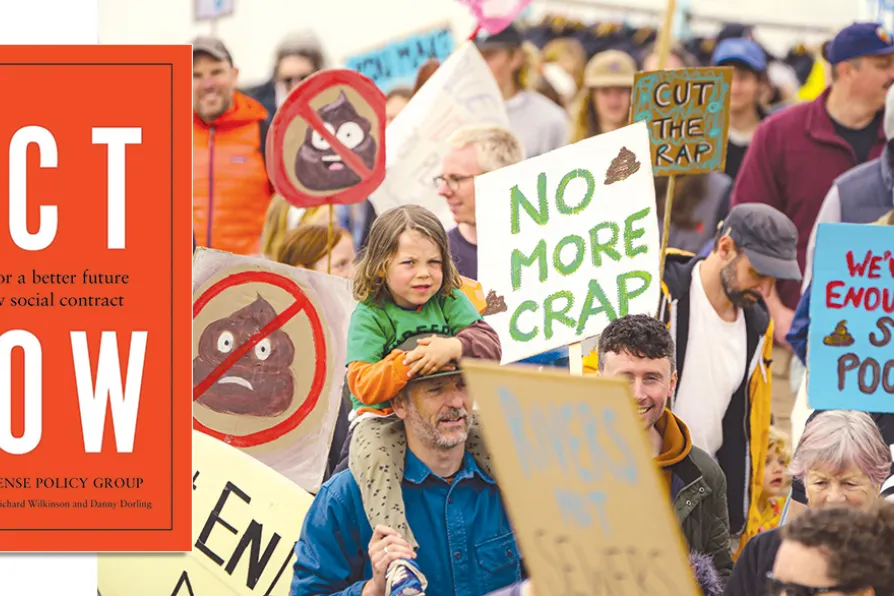MICHAL BONCZA, MARIA DUARTE and ANGUS REID review The Other Way Around, Modi: Three Days On The Wing Of Madness, Watch The Skies, and Superman

 TIRED OF WAITING: Campaigners gather on Fistral Beach, Newquay on National Day of Action on Sewage Pollution one of 12 simultaneous protests against the UK's water companies on April 23 2022
TIRED OF WAITING: Campaigners gather on Fistral Beach, Newquay on National Day of Action on Sewage Pollution one of 12 simultaneous protests against the UK's water companies on April 23 2022
Act Now – A Vision for A Better Future and A New Social Contract
Common Sense Policy Group
Manchester University Press, £9.99
WHAT an incredibly timely book this is. The authors, featuring Kate Pickett, Richard Wilkinson and Danny Dorling, are a collective of leading figures from academia, politics and industry who share a common belief in the need for pragmatic reform to end our crisis.
It has become patently obvious that we cannot go on as we are, perpetuating an era of decline for many people, with politicians from all perspectives responding inadequately to the genuine needs of Britain’s population. Forget tinkering around the edges. Now is time for real change and to rebuild from the ground up, not just by reigniting the economy but reforming the whole structure of society.
This book starts off looking back at the Beveridge Report, the basis of the reforms that assured Clement Attlee a landslide election victory in 1945.
I have in my possession an original copy of the popular magazine Picture Post, dated January 4 1941. With Britain still in the grip of a terrible war, the entire issue devotes itself to a “Plan for Britain” based on Beveridge, advocating radical reforms in housing, education, employment, healthcare, giving youth a real chance and equality for all. Now, 83 years on, so many of these basic ideas have been either watered down or kicked out.
Act Now exposes the huge catalogue of failures that have put many services and lives at the point of collapse such as healthcare, housing and child poverty. There’s a quote from Nelson Mandela: “There can be no keener revelation of a society’s soul than the way it treats its children.”
Poverty and inequality are the factors that inhibit child development, health and wellbeing, and right now in the UK there are at least 4.3 million children living in poverty. And just like most other issues, there are gross regional inequalities.
All 13 chapters in this book are structured identically starting with a “Chapter in 30 seconds,” a single paragraph summarising the chapter’s findings, before then developing a full analysis and suggested reforms.
For example, Chapter 5, Public Utilities, highlights the decades-long failure as an ideological experiment, declaring that the privatisation of public utilities is an aberration that can be sustained only by subsidising profits, paying more on bills, accepting dependence on fossil fuels and receiving poorer services in return. It then advocates bringing energy and water into public ownership and outlines what this should look like: not just central control, but local and regional involvement with new systems of accountability.
Every chapter ends with recommendations, sensible pragmatic ideas based on achievable vision such as introducing a basic income and developing the transition to sustainable living.
Act Now provides clear outlines on active citizenship, economic democracy, policies for health, social care, education, housing, people-powered public services and actions for change; everything our society needs to respond and rebuild. Citizens must be engaged in decision-making processes, ideas generated through collaboration, and the collective intelligence of communities harvested to inform policies.
Act Now clearly demonstrates the need for radical change together with well-researched outlines on both how it can be done and the part all of us can play in bringing this about.
This is a brilliant book that should be compulsory reading for all MPs. Alternatively, put pressure on your MP to give both ourselves and our children a future. Maybe then, our faith in society delivering diversity, equality and a sense of collective responsibility will be restored.
Read this book. Act Now.

PAUL DONOVAN is fascinated by a deep dive into contemporary social crises, that examines how they are manipulated by elites

HENRY BELL takes issue with the assertion that basic income is a remedy for poverty when it doesn’t address the inbuilt inequality of capitalism












